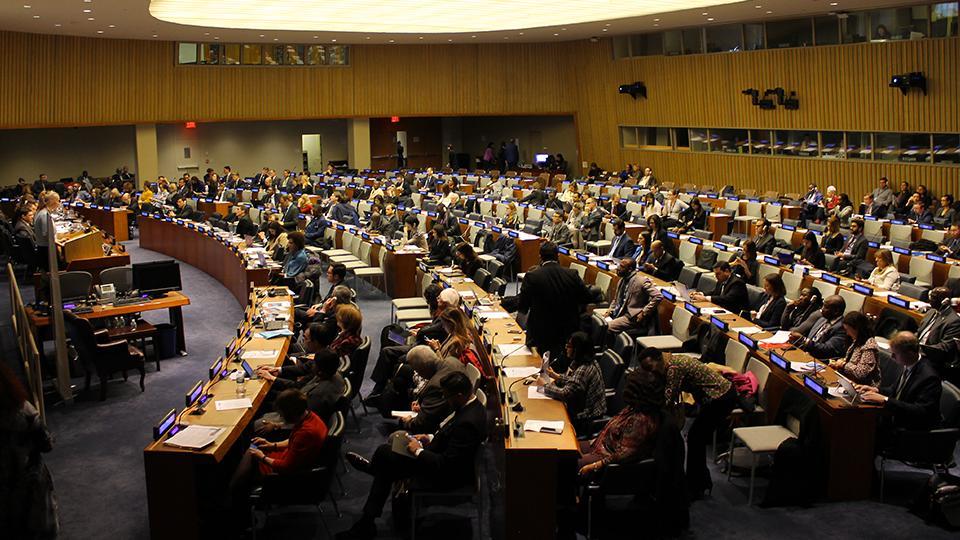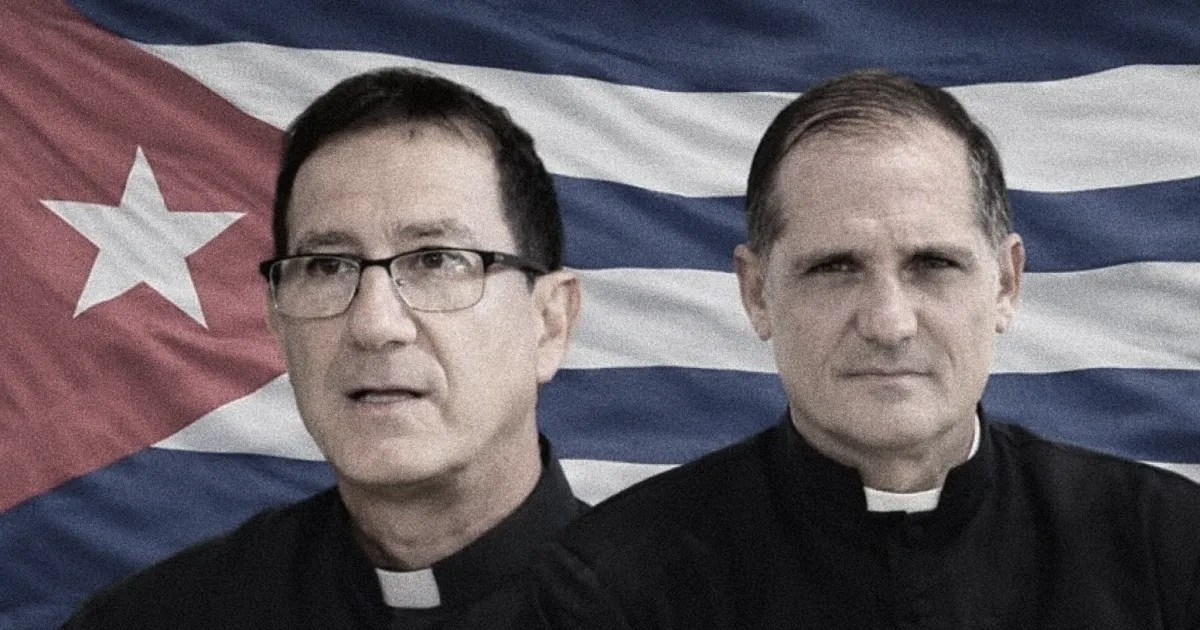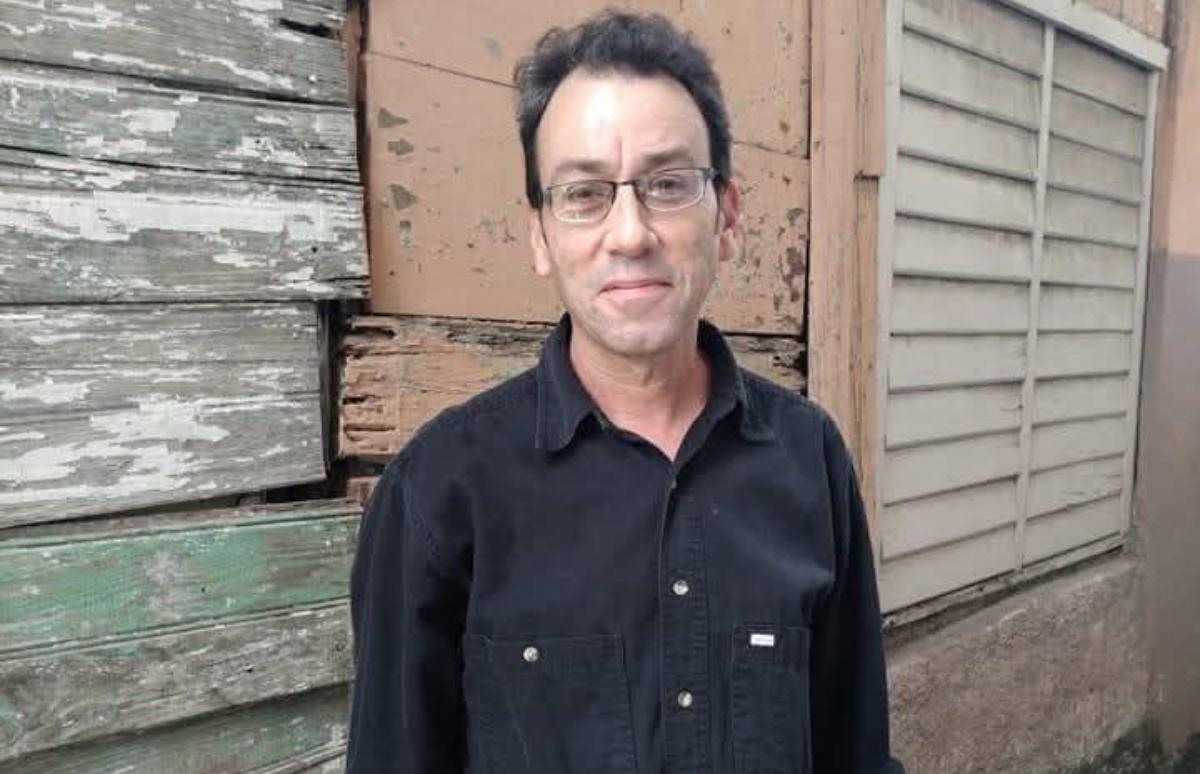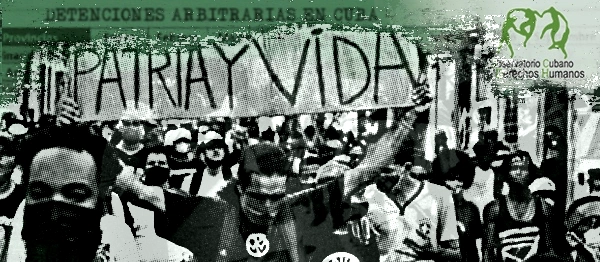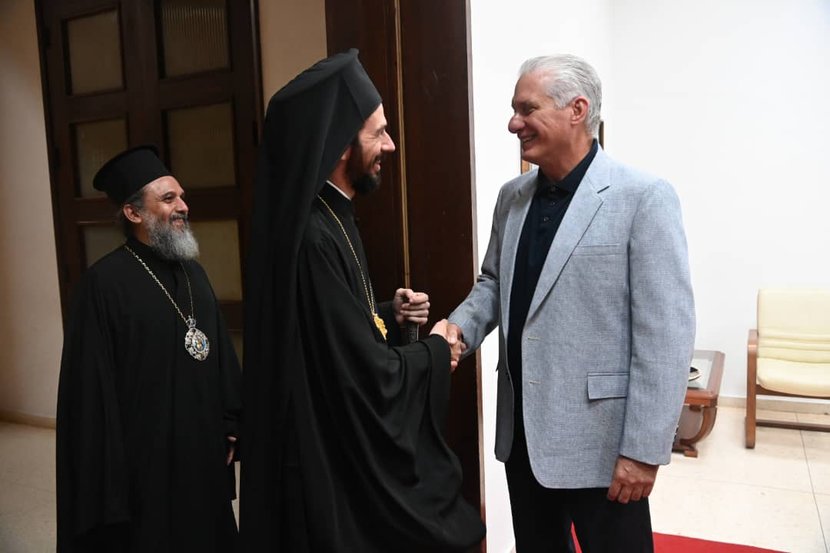Muchas gracias a todos los que han hecho posible este encuentro, especialmente a la embajadora Kelly Currie, al señor embajador Michael Kozack y al señor secretario de la Organización de Estados Americanos, Luis Almagro, por su presencia en este acto.
«El dolor del presidio es el más rudo, el más devastador de los dolores, el que mata la inteligencia, y seca el alma, y deja en ella huellas que no se borrarán jamás», dijo José Martí el héroe nacional sobre el presidio político cubano en 1871.
Es para mí realmente un honor poder dirigirme a ustedes hoy aquí. Y agradezco profundamente esta oportunidad, que implica una enorme responsabilidad, porque es imposible que mi testimonio exponga en toda su hondura el coraje, el sacrificio y la esperanza de todos los hombres y mujeres que estuvieron y están hoy en las prisiones cubanas por motivos políticos.
Speech by Alejandro González Raga, former Cuban political prisoner and Executive Director of the OCDH (Cuban Observatory for Human Rights) in the launch event of the «Jailed For What» campaign of the United Nations on October 16, 2018.
Many thanks to all those who made this meeting possible, especially Ambassador Kelly Currie, Ambassador Michael Kozack and the Secretary of the Organization of American States, Luis Almagro, for their presence at this event.
«The pain of the imprisonment is the most severe, the most devastating of pains, the one that kills intelligence, and dries the soul, and leaves in it traces that will never be erased.» José Martí, Cuban national hero, 1871, about political incarceration.
It is truly an honor for me to be able to address you here today, and I deeply appreciate this opportunity, which carries an enormous responsibility, because it is impossible for my testimony to fully expose the courage, sacrifice and hope of all the men and women who have been and are today in Cuban prisons for political reasons.
I myself have experienced this, of having spent five years in prison, after the wave of arrests and summary trials carried out by the regime, in what is known as the Black Spring of 2003. With that action, the Cuban government sought to counteract the Varela Project, a citizens’ proposal that propagates essential changes in the Constitution, in the aim of guaranteeing internationally recognized human rights. In this capacity, it is also my duty to warn that the new Constitution drafted by the Cuban government, continues to ignore such rights.
On that occasion, with more than 10 thousand signatures in its support, the Varela Project was delivered to the National Assembly of People’s Power in Cuba, on May 10, 2002. We relied on a «breach» of the 1992 Constitution, which allowed registered voters to propose laws. Not only did the signatures surpass the requirements, but the scale of demands for freedom of expression and association; for changes in electoral law; for political amnesty; and for reconciliation among Cubans, grew exponentially among the population.
Furthermore, these events brought unity among the different opposition groups, and began to attract the attention of the international community. The response of the Cuban government is well known, and despite the regime´s attempts to hide its repressive approach, they could not deny the fact that 75 activists were imprisoned that Black Spring, with sentences ranging from 6 to 25 years in prison, for their «defiance» and for engaging in the reporting of events.
In the searches made in our residences, they found printers, computers, pens and pencils, radios to listen to the news of foreign radio stations, some manuscripts, and copies of the Universal Declaration of Human Rights. These constituted the material proof of our great «crime». (Pause).
The regime the immediately reformed the Constitution to shield any other breach of dissent, and curbed democracy, thus proclaiming «the irreversibility of the socialist character of the Revolution.»
Thousands of political prisoners, can testify to this cruel and unacceptable cruelty, one such person is Mario Chanes de Armas, whose case summarizes the treatment of the regime with which he disagrees. Chanes de Armas served 30 years in prison from 1960 to 1991. He spent seven years without family visits, for refusing to wear the uniform of a common prisoner. Whilst in jail he missed the birth and death of his son, aged 22, and the death of his parents. Chanes de Armas spent more years in prison than Nelson Mandela, but his case did not receive the same attention on the international plane.
Or Eusebio Peñalver Mazorra, who has spent 28 years in prison for challenging the regime. Likewise Hubert Matos Benítez and Ángel de Fana Serrano: 20 years for refusing to participate in the process, and other cases such as those of René Hernández and Reinol González.
It is impossible to include here all the names of those unjustly punished, because they wanted to enforce the Universal Declaration of Human Rights, which considers it essential that they be “protected by a regime of law, so that man is not compelled to the resort to rebellion against tyranny and oppression. »
This is the case of Armando Sosa Fortuny, a sick old man who has spent 42 of his 76 years in prison, and to whom the regime refuses to grant amnesty for having taken part in the rebellion. Even when, those who keep him in prison, assaulted a barracks in 1953, they received amnesty, and years later they gained power, shielding the lives of hundreds of Cubans, and all in the name of a freedom that they later broke.
Rebelling against that removal of rights is what Fortuny is condemned for, and if that «guilt» is kept alive by his jailers (who were also his judges), it is the proof that the motives which impelled it, are still active. Today however the freeing of Armando and his colleagues, who have already served 24 years in prison, is not a political issue, or even a legal one, it is a matter of humanity.
Beatings, humiliation, threats, and mock executions are part of the methods used against those people who, for purely political reasons, end up behind the bars of the innumerable Cuban prisons. They belong to various active opposition organizations, and for any impartial observer (despite the fictitious causes given by the government, based on false evidence), they are imprisoned because of their civic and political activism.
A recent example of the Cuban government’s methods against opponents, activists and human rights defenders, was the attempt to imprison investigator Ariel Ruiz Urquiola; a detention that has just been declared arbitrary by the United Nations Working Group.
A chapter without which the Cuban drama could not be understood is that of women who have been imprisoned for political reasons. Women like Polita Grau, Georgina Cid, Olga Rodriguez Morgan, Albertina O`Farrill, Aracelis Rodriguez or Cary Roque. They are just some examples from a long list.
I will read a testimony that will give an idea of what has been and is for them the experience of political prison in Cuba:
»There were hundreds of us, political prisoners, in Guanabacoa, and they wanted to move us to Guanajay, where the conditions were unbearable… The prison was completely surrounded by some 600 armed men and women… They attacked us with water hoses, with a pressure of between 200 and 300 pounds… There was a prisoner who was six months pregnant and they directed the jet of water directly against her belly, causing a miscarriage. Many of us ran to protect her and cover her with our bodies… «
The incident occurred during the Bay of Pigs invasion and still occurs today with the Ladies in White, some of whose members are unjustly imprisoned. But the previous testimony also shows the solidarity that is established, in the worst circumstances, among those who suffer the same injustice. Such solidarity is imperative.
The loneliness of the prisoner who knows that his cause is attended by justice and dignity, but that no one accompanies him, is perhaps what weakens most; more than hunger, beatings, darkness, or overcrowded and unhealthy conditions.
For political prisoners we ask for solidarity, but that is not enough. We must maintain a commitment to our demand to the Cuban government in all that concerns human rights; that they allow the access of international organizations to prison institutions without reservations; and, especially, that they immediately repeal from Cuban legislation those aspects that allow unjust imprisonment, without the slightest procedural guarantee or following of due process, as happened recently in the cases of the Ladies in White: Nieves Caridad Matamoros González, Aymara Nieto Muñoz, Martha Sánchez González, Yolanda Santana Ayala, Xiomara de las Mercedes Cruz Miranda, Micaela Roll Gilbert, Daysi Artiles Sol. For them we demand unconditional freedom.
The same can be said for the 50 prisoners of the Patriotic Union of Cuba and many others who belong to opposition organizations and civil society.
I want to end this speech by saying that the release of the prisoner of the Patriotic Union of Cuba Tomás Núñez Magdariaga, after 60 days on hunger strike, is the first success of this campaign.
Thank you.
The following have partaken in this event:
Ambassador Kelley E. Currie, Representative of the United States in the Economic and Social Council of the United Nations; Ambassador Michael Kozak of the Office of Democracy, Human Rights and Labor of the United States State Department; Luis Almagro, Secretary General of the Organization of American States, Carlos Quesada, Executive Director of the Institute of Race and Equality, and Alejandro González Raga, former Cuban political prisoner and Director of the Cuban Observatory of Human Rights
Conozco la experiencia al haber estado cinco años en prisión, después de la oleada de arrestos y juicios sumarísimos y sin garantías del régimen, en lo que se conoce como la Primavera Negra del 2003. Con aquella acción, el gobierno cubano pretendía contrarrestar el Proyecto Varela, una propuesta ciudadana que propone cambios esenciales en la Constitución, para garantizar los derechos humanos internacionalmente reconocidos. A propósito, es mi deber advertir que la nueva Constitución redactada por el gobierno cubano sigue ignorando tales derechos.
En aquella ocasión, más de 10 mil firmas de apoyo entregamos los gestores del Proyecto Varela a la Asamblea Nacional del Poder Popular en Cuba, el 10 de mayo del 2002. Nos apoyamos en una “brecha” de la Constitución de 1992, que permitía a los electores registrados proponer leyes. No solamente las firmas superaron lo requerido, sino que el clamor por las peticiones de libertad de expresión y asociación, de cambios en la ley electoral, de amnistía política, de reconciliación entre cubanos, crecían imparables entre la población.
Además, eran motivo de unidad entre los distintos grupos de la oposición y comenzaban a llamar la atención de la comunidad internacional.
La respuesta del gobierno cubano es conocida. Y aunque el régimen siempre ha intentado ocultar su rostro absolutamente represivo, 75 activistas fuimos encarcelados esa Primavera Negra, con condenas que oscilaron entre 6 y 25 años de cárcel, por aquel “atrevimiento” y por hacer periodismo.
En los registros realizados en nuestras residencias encontraron impresoras, ordenadores, lápices, bolígrafos, radios para escuchar las noticias de emisoras extranjeras, algunos manuscritos y copias de la Declaración Universal de los Derechos Humanos. Estas fueron las pruebas materiales de nuestro gran «delito». (Pausa).
De inmediato, el régimen reformó la Constitución para blindar cualquier otra brecha a la disidencia, y remató la democracia proclamando “la irreversibilidad del carácter socialista de la Revolución”.
Fuimos llevados a prisiones de máxima severidad, en medio de un inusitado y aparatoso despliegue policial; encerrados en celdas de castigo, en régimen de aislamiento, con una frecuencia de visitas de dos horas cada tres meses para tres personas, y dos visitas conyugales al año. En todos los casos, en prisiones alejadas de nuestros lugares de origen, como escarmiento añadido para la familia.
Siendo por sí mismos los episodios de cárcel verdaderamente traumáticos, cuando han sido resultado de la injusticia, cuando el carcelero (un gobierno totalitario) te mantiene ex-profeso en una situación de constante vulnerabilidad en deliberada obligación de convivencia con otros condenados por crímenes de diversa naturaleza, en un medio adverso, y el mensaje de que eres un ser despreciable que no merece ningún respeto, entonces todo se torna en desafío y la vida es una insoportable situación extrema.
De este cruel e inaceptable ensañamiento pueden dar fe miles de presos políticos, como Mario Chanes de Armas, que resume el tratamiento del régimen contra el que disiente. Chanes de Armas cumplió 30 años de prisión desde 1960 a 1991. Estuvo siete años sin visitas familiares, por negarse a usar el uniforme de preso común. En la cárcel vivió el nacimiento y la muerte de su hijo, de 22 años, y la muerte de sus padres. Chanes de Armas pasó en prisión más años que Nelson Mandela, pero su causa no tuvo el mismo tratamiento.
O Eusebio Peñalver Mazorra, con 28 de cárcel por enfrentarse al régimen. Hubert Matos Benítez y Ángel de Fana Serrano: 20 años por negarse a participar en el proceso, y otros casos como el de René Hernández y Reinol González.
Es imposible desgranar aquí los nombres de todos, algunos olvidados, porque quisieron hacer valer la Declaración Universal de los Derechos Humanos, que “considera esencial que sean protegidos por un régimen de Derecho, a fin de que el hombre no se vea compelido al supremo recurso de la rebelión contra la tiranía y la opresión”.
Este es el caso de Armando Sosa Fortuny, un anciano enfermo que ha pasado en la cárcel 42 de sus 76 años de vida, y que el régimen se niega a amnistiar por haber asumido el supremo recurso de la rebelión. Incluso cuando, quienes le mantienen en prisión, asaltaron un cuartel en 1953, luego fueron amnistiados, y años más tarde consiguieron el poder, cegando la vida de centenares de cubanos. Todo en nombre de una libertad que luego quebrantaron.
Rebelarse contra ese despojo es la culpa de Fortuny, y si esa «culpa» se mantiene viva para sus carceleros (que también fueron sus jueces), es la muestra de que los motivos que le impulsaron, mantienen su vigencia. Pero hoy liberar a Armando y a sus compañeros, que han cumplido ya 24 años de condena, no es un tema político, ni siquiera jurídico, es un asunto de humanidad.
Golpizas, vejaciones, amenazas, simulacros de ejecución son parte de los métodos usados contra ellos y contra quienes, por motivos puramente políticos, fueron a parar tras las rejas de las innumerables prisiones cubanas. Pertenecen a distintas y activas organizaciones opositoras, y para cualquier observador imparcial (a pesar de las causas ficticias incoadas por el gobierno a partir de pruebas falsas), están presos por su activismo cívico y político.
Una reciente muestra de los métodos del gobierno cubano contra los opositores, activistas y defensores de derechos humanos fue el intento de encarcelar al investigador Ariel Ruiz Urquiola; detención que acaba de ser declarada arbitraria por el Grupo de Trabajo de las Naciones Unidas.
Un capítulo sin el cual no se entendería el drama cubano son las mujeres encarceladas por motivos políticos. Mujeres como Polita Grau, Georgina Cid, Olga Rodriguez Morgan, Albertina O`Farrill, Aracelis Rodriguez o Cary Roque. Son ejemplos de una larga lista.
Leo un testimonio que dará una idea de lo que ha sido y es para ellas el presidio político en Cuba:
“Habían cientos de nosotras, prisioneras políticas, en Guanabacoa, y nos querían trasladar a Guanajay, donde las condiciones eran insoportables… La cárcel quedó completamente rodeada por unos 600 hombres y mujeres armadas… Nos atacaron con mangueras de agua, con una presión entre 200 y 300 libras… Había una presa que tenía seis meses de embarazo y le dirigieron el chorro de agua directamente contra el vientre para hacerla abortar. Muchas de nosotras corrimos para protegerla y cubrirla con nuestros cuerpos…”.
El hecho ocurrió durante la invasión de bahía de cochinos y ocurre hoy con las Damas de Blanco, algunas de cuyas integrantes están injustamente presas. Pero el anterior testimonio muestra también la solidaridad que se establece, en las peores circunstancias, entre quienes sufren la misma injusticia. La solidaridad es necesaria.
La soledad del preso que sabe que a su causa le asiste la justicia y la dignidad, pero que nadie le acompaña, es quizá lo que más debilita; más que el hambre, las golpizas, la oscuridad, las condiciones de hacinamiento e insalubridad.
Para los presos políticos pedimos solidaridad, pero no es suficiente. Hay que asumir un compromiso con la exigencia al gobierno cubano en materia de derechos humanos; que admita el acceso de organizaciones internacionales a las instituciones carcelarias sin reservas; y, especialmente, que derogue inmediatamente de su legislación aquellos aspectos que le permiten encarcelar la discrepancia, sin la más mínima garantía procesal, sin apego al debido proceso. Como ha sucedido recientemente en los casos de las Damas de Blanco: Nieves Caridad Matamoros González, Aymara Nieto Muñoz, Martha Sánchez González, Yolanda Santana Ayala, Xiomara de las Mercedes Cruz Miranda, Micaela Roll Gilbert, Daysi Artiles Sol. Para ellas exigimos libertad incondicional.
O con los 50 prisioneros de la Unión Patriótica de Cuba y tantos otros de organizaciones de la oposición y la sociedad civil.
Quiero finalizar esta intervención diciendo que la excarcelación del prisionero de la Unión Patriótica de Cuba Tomás Núñez Magdariaga, tras 60 días en huelga de hambre, es el primer éxito de esta campaña.
Muchas gracias.
Han intervenido en el evento:
La Embajadora Kelley E. Currie, Representante de los Estados Unidos en el Consejo Económico y Social de las Naciones Unidas; el Embajador Michael Kozak, de la Oficina de Democracia, Derechos Humanos y Trabajo del Departamento de Estado de los Estados Unidos; Luis Almagro, Secretario General de la Organización de Estados Americanos, Carlos Quesada, Director Ejecutivo del Instituto de la Raza y Igualdad y Alejandro González Raga, ex preso político cubano y Director del Observatorio Cubano de Derechos Humanos
Listado de los presos políticos que hay actualmente en las cárceles cubanas

